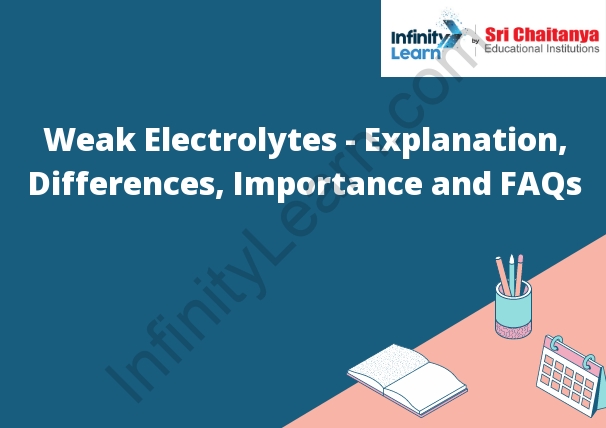Table of Contents
Introduction to Weak Electrolytes
A weak electrolyte is a molecule that, when dissolved in water, ionizes to a very limited extent. This means that only a small fraction of the weak electrolyte molecules break down into ions in solution. As a result, weak electrolytes produce relatively weak electrical currents when placed in an electrolyte solution. Weak Electrolytes – Explanation Differences Importance and FAQs.
Some common weak electrolytes include ammonia, acetic acid, and carbon dioxide. These molecules produce ions in solution but to a much lesser extent than strong electrolytes like sodium chloride. Weak electrolytes are often used in biochemistry to study the movement of ions across cell membranes.

Types of Electrolytes
There are three types of electrolytes: cations, anions, and electrolytes. Positively charged ions called cations, negatively charged ions called anions, and any ions that can dissolve in water called electrolytes all exist. Both cations and anions attract each other, due to their electrically charged nature. This attraction creates an electrical field, which is what allows electrolytes to conduct electricity.
What Are Strong Electrolytes and Weak Electrolytes?
Strong electrolytes are ions that completely dissociate in water, meaning that they release all of their electrons. Weak electrolytes are ions that only partially dissociate in water, meaning that they do not release all of their electrons.
Difference Between Strong Electrolyte and Weak Electrolyte
An electrolyte is a substance that dissolves in water to produce ions. A strong electrolyte is a substance that dissolves in water to produce ions and is strong enough to keep those ions separated. A weak electrolyte is a substance that dissolves in water to produce ions, but is not strong enough to keep them separated.
A strong electrolyte will produce more ions than a weak electrolyte. The ions from a strong electrolyte will be more stable because they will be more strongly attracted to the negative end of the water molecule. This will make it difficult for the ions to recombine and form the original substance. A weak electrolyte will produce fewer ions than a strong electrolyte. The ions from a weak electrolyte will be less stable because they will be less strongly attracted to the negative end of the water molecule. This will make it easier for the ions to recombine and form the original substance.
A strong electrolyte will produce a stronger solution than a weak electrolyte. A strong electrolyte will produce a solution that is more acidic because of the increased number of hydrogen ions. A weak electrolyte will produce a weaker solution than a strong electrolyte. A weak electrolyte will produce a solution that is more alkaline because of the decreased number of hydrogen ions.
The physiological importance and rehydration of weak electrolytes are as follows:
Weak electrolytes are important for maintaining fluid balance and preventing dehydration. They also help to regulate nerve and muscle function. Dehydration causes your body to lose electrolytes, leading to muscle cramps, weakness, and dizziness. Drinking fluids that contain electrolytes can help to rehydrate your body and restore its balance.
FAQs
Q: What is a weak electrolyte?
A: A weak electrolyte is a substance that only partially dissociates into ions when in a solution. Weak electrolytes are typically weak acids and/or weak bases, and they do not completely ionize when dissolved in water. Examples of weak electrolytes include acetic acid, carbonic acid, and ammonia.
Q: What are the properties of a weak electrolyte?
A: Weak electrolytes have the following properties:
• They are generally poor conductors of electricity
• They have relatively low concentrations of ions in aqueous solution
• They tend to resist changes in their ion concentrations
• They do not completely dissociate into ions when dissolved in water
• They are not strong acids or bases
Q: How do weak electrolytes behave in a solution?
A: Weak electrolytes partially dissociate into ions when in a solution. This means that the ions are formed in relatively low concentrations, and the solution usually does not conduct electricity very well. Additionally, the concentrations of ions in the solution remain relatively constant and do not change much over time.
Q: What is the difference between a weak electrolyte and a strong electrolyte?
A: The main difference between a weak electrolyte and a strong electrolyte is the degree to which they dissociate into ions when dissolved in water. Strong electrolytes completely dissociate into ions and have relatively high concentrations of ions in their solutions. Weak electrolytes, on the other hand, only partially dissociate and have relatively low concentrations of ions in their solutions.
Weak Electrolytes – Explanation Differences Importance and FAQs.








